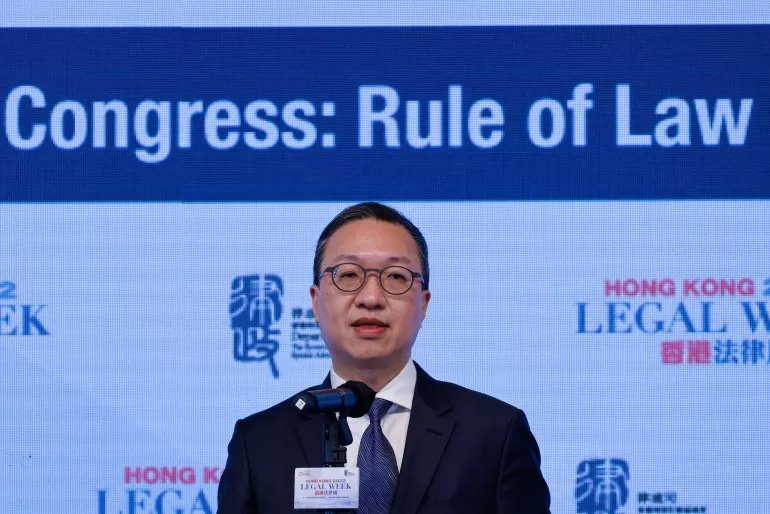Until February 28, the Hong Kong government is canvassing views on its plans to implement “Article 23” of the Chinese territory’s mini constitution, which stipulates the need to ban crimes including treason, secession, sedition, subversion and theft of state secrets.
After meeting foreign diplomats and business representatives last week, Justice Secretary Paul Lam reported that “everyone is on the same page” on the need to pass the legislation.
Lam said that while some members of the public had “concerns” and “questions,” it would be going too far to say they expressed “worries”.
It was not long before Lam’s upbeat characterisation of sentiment began to look misplaced.
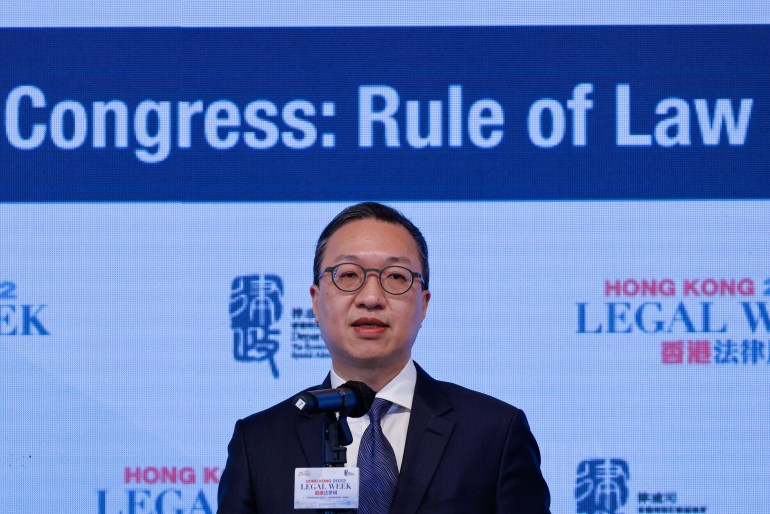
In interviews with local media, the heads of the Indonesian and German chambers of commerce said businesses were concerned about how the law would be enforced and whether it would bring the former British colony into further alignment with the Chinese mainland.
Speaking anonymously to Bloomberg News, several attendees of the consultation session said officials only answered about four questions and left some of those present unsatisfied.
Hong Kong’s proposal, which faces little prospect of opposition in the city’s legislature after an electoral overhaul that effectively barred pro-democracy candidates, builds on sweeping national security legislation imposed by Beijing in 2020, following mass pro-democracy protests that turned violent.
Under the Beijing-drafted national security law, Hong Kong’s political opposition, pro-democracy civil society, and independent media have been all but wiped out.
“Many senior executives already concerned about the tightening atmosphere in Hong Kong will see the new laws as merely heightening their fears,” Andrew Collier, the founder and managing director of Orient Capital Research in Hong Kong, told Al Jazeera.
“Article 23 also is a signal that the Hong Kong domestic politicians, and not just the mainland officials through the NSL, are now focusing on security in order to please Beijing.”
Hong Kong’s government appears to be sending the message that political control trumps all else, including the economy – much like in mainland China, Collier said.
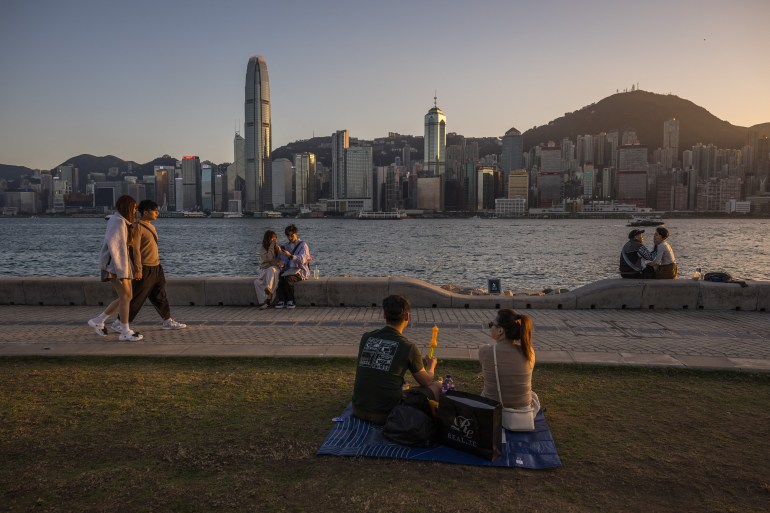
For more than two decades after its return to Chinese sovereignty, Hong Kong’s reputation as a business hub was buttressed by a trusted legal system inherited from the British and Western-style civil liberties.
That image has suffered successive blows in recent years, from mass unrest and property destruction during the 2019 pro-democracy protests, to Beijing’s security crackdowns and some of the world’s longest-lasting COVID curbs during the pandemic.
Even voices known for their bullish views on China have lamented the city’s decline.
In an opinion piece in the Financial Times this week, Stephen Roach, the former chairman of Morgan Stanley Asia, declared that “Hong Kong is now over”.
“In the spring of 2019 at the onset of the democracy protests, the Hang Seng Index was trading at nearly 30,000,” Roach said, referring to the benchmark index of the city’s stock market.
“It is now more than 45 per cent below that level at 15,750. Milton Friedman’s favourite free market has been shackled by the deadweight of autocracy.”
A Hong Kong government spokesperson told Al Jazeera that enacting national security legislation is the “inherent right of every sovereign state” and that the government’s proposed definition of state secrets is “in line with international practices”.
The spokesperson also said the provisions related to state secrets would “only cover acts committed without lawful authority” and the introduction of a “public interest” defence was under consideration.
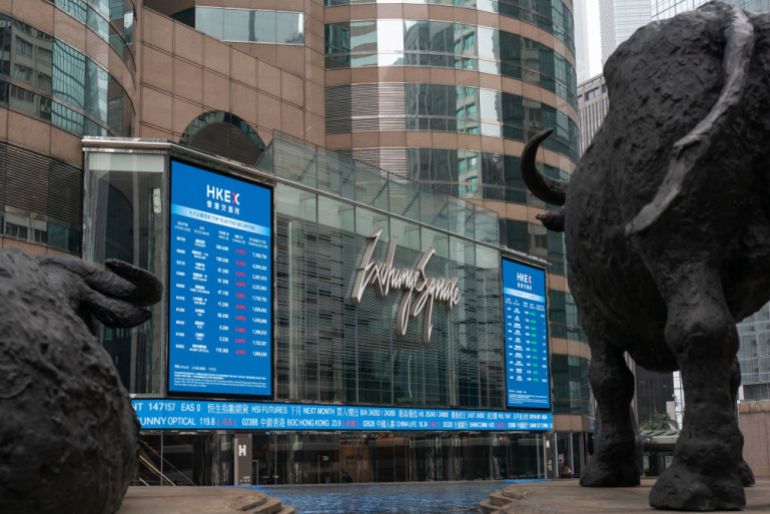
When Hong Kong was once known for a culture of vigorous protest, public demonstrations against Beijing or city officials were practically unheard of in the post-NSL era.
The muted opposition to enacting Article 23 is a sign of the times.
In 2003, when Hong Kong’s government last attempted to pass legislation related to Article 23, half a million people took to the streets in the largest protests the city had ever seen.
When pro-government broadcaster TVB recently asked members of the public for their opinions on the proposed legislation in a series of street interviews, person after person demurred.
Kevin Yam, a senior fellow at Georgetown’s Center for Asian Law and former Hong Kong lawyer who is wanted by city authorities for alleged national security offences, said Article 23 may do to Hong Kong’s economy what the NSL did to civil society.
“With the NSL to the extent it affected business, it was more about creating a climate of fear. It was more a vibe. It was more the loss of qualified personnel who chose to leave Hong Kong. It’s more indirect,” Yam told Al Jazeera from Australia, where he lives in exile.
“Whereas this time around, if we look at the sorts of things that businesses might need to worry about in terms of implications of these changes, it impacts them much more directly,” Yam said.
State secrets
Of particular concern for businesses is Article 23’s provisions about state secrets, which some fear will be used to adopt mainland China’s expansive definitions of espionage and hamper companies’ ability to gather and share information as part of routine operations.
Observers have noted that the definition of state secrets in Hong Kong’s proposed legislation is nearly identical to the wording in China’s Law on Guarding State Secrets.
In mainland China, foreign consulting firms Capvision Partners, Mintz Group and Bain & Company were raided last year as part of a campaign targeting alleged espionage.
Beijing has also demonstrated that even the most seemingly minor infractions can have serious consequences, as in the case of Chinese-Australian journalist Cheng Lei, who spent nearly three years in prison after breaking a news embargo by a few minutes.
In January, Chinese state media reported that a citizen had been “punished by national security agencies in accordance with the law” after sharing fabricated evidence of environmental problems in China’s seafood industry with a foreign NGO.
“The big worry is Hong Kong moving in the same direction to what we’re seeing on the mainland right now,” Nick Marro, a China analyst at the Economist Intelligence Unit, told Al Jazeera.
“One of Hong Kong’s biggest strengths structurally and historically has been the fact that you don’t have that uncertainty around red lines like you do in mainland China. You have historically been able to talk about things that are politically sensitive.”
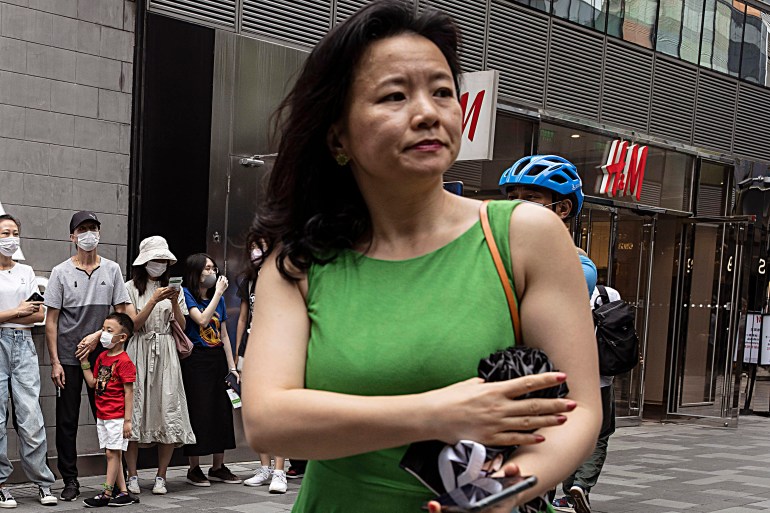
While such risks may be seen by some foreign firms as the cost of doing business in the world’s second-largest economy, they may be harder to accept in a Hong Kong that is both much smaller and less free.
If Hong Kong loses its openness, its historic selling point, companies may begin redirecting investment and hiring elsewhere, the head of one foreign business chamber in Hong Kong said.
“One of the things that comes across from the business community is we get it; we understand that this law needs to be enacted,” the person told Al Jazeera, requesting anonymity.
“For us, the key issue is going to be cost of implementation and differentiation of Hong Kong vis-à-vis the mainland.”
Despite officials’ insistence that the city is still a welcome home for foreign companies and their regional offices, the first two chapters of the government’s consultation paper on the national security law tell a different story, the person said.
“Out of those 42 paragraphs, exactly one mentions Hong Kong’s role as an international city, and exactly one paragraph mentions that this is a place where people come to engage, and where there’s interchange. All the other 41 concern all the threats there are to security and safety here,” the representative said.
“If you read it from the perspective of a businessperson, you kind of think, ‘Well, I just want to do business there. Am I welcome?’”
